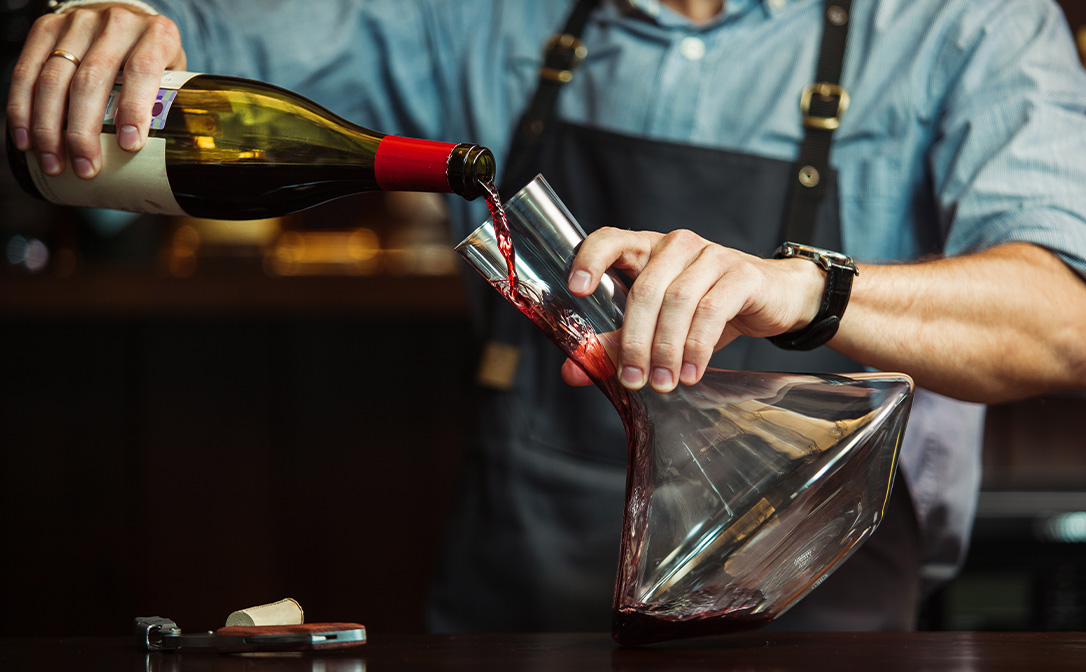There are a lot of commonly asked questions about wine. We’ve gathered a few that have been put to us to help clear up some assumptions and misconceptions.
If you have any burning questions, feel free to message us and we’ll do our best to answer them!
How many glasses of wine are there in a standard bottle?
A standard bottle of wine is 750ml. While there isn’t really a “correct” answer for how much to pour in a glass, in the UK, you’ll typically see pours of 125ml, 175ml or even 250ml in pubs, bars and restaurants. In the US this is more commonly about 150ml (5fl. oz).
In France 125ml and 150ml are usual. If we take the average - about 150ml (5fl. oz) you should have five servings of wine from each bottle. This can vary however by wine style.
What is the standard serving size for sparkling wine?
Sparkling wine serving sizes are usually about 125ml (about 4fl. oz is more typical in the US). Based on this measure a single bottle holds at least six servings.
What is the standard serving size for fortified wines?
Fortified wines, such as sherry or port are usually served as smaller measures than still dry wine. Dry sherry is often served as a 100ml measure and sweeter styles as 75ml pours.
Does all wine need to be aged before it can be drunk?
Not at all, in fact, the vast majority of wines produced are intended to be consumed young. While some “fine wines” are sold that will benefit from some more time in the bottle, don’t panic if you don’t have space for a wine cellar! Most of the wine you buy from the supermarket is best enjoyed soon after purchase!
Do I need to decant my red wine?
During the bottle ageing process, some red wines naturally form a deposit. These include vintage ports, wines capable of ageing in bottle and red wines made with little filtration.
Ideally, wines with a heavy deposit should be decanted. Although it will cause you no harm, this sediment may taste bitter or astringent – and it can look unappealing in the glass!
As most everyday table wines are well filtered and aren’t designed for ageing, they are unlikely to produce sediment, so it’s rare you will need to decant your wine.
There is another traditional but disputed reason for decanting – to promote aeration. The tradition of decanting wine to let it breathe is a longstanding one, with advocates arguing that some older or fine wines may benefit from “opening up.”
However, some experts argue that rather than improving a wine, the longer and more exposed a wine is to oxygen, the more diffuse its aromatic and flavour characteristics become. They would argue that in most cases, swirling wine in your glass is all the aeration needed.
If you do choose to decant to allow your wine to breathe, it’s recommended that you only do so for a short time, just before you intend to serve and enjoy it. For younger wines, there’s really no standard advice, the best thing is to experiment a little and see what works for you!
Keen to discover more about the basics of wine characteristics? Our internationally recognised Level 1 Award in Wines will give you the foundation of knowledge to begin your journey in wine. Find out more here.
How do I decant a red wine?
At all stages make sure you’re moving the bottle as gently as possible and doing your best not to agitate the sediment.
- First, remove the bottle horizontally from its rack and hold it carefully, ensuring the deposit is not disturbed.
- While moving the bottle as little as possible, remove the top of the foil capsule and carefully remove the cork.
- Holding the bottle in front of a light, pour the wine carefully into the decanter until the deposit can be seen near the neck. At this point stop pouring 😊
Should I decant my white wine?
Since they are far less likely to form a deposit in the bottle, few white wines need to be decanted. Some white wines might produce harmless little crystals called tartrates. These aren’t particularly pleasant to taste, so decanting to ensure they don’t end up in the glass is not a bad idea!
As with red wines, there are some who find that (particularly with older or fine white wines) they may need to open up. Again, as with red wines, they would only need to be decanted immediately before being consumed.
Related content:
- Great guides to food and drinks pairing
- Understanding the Sommelier Levels
- A guide to wine types and styles




